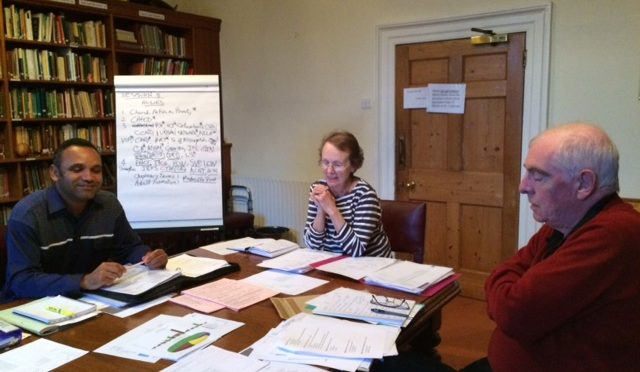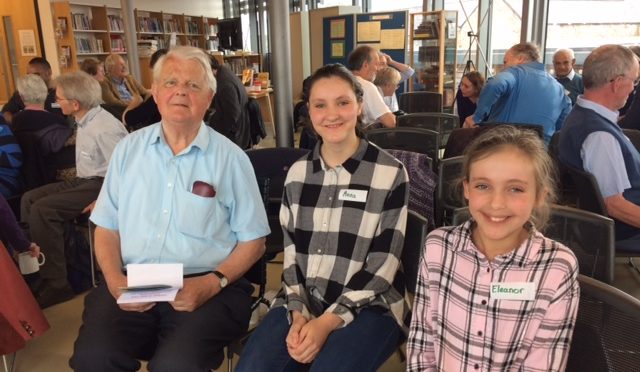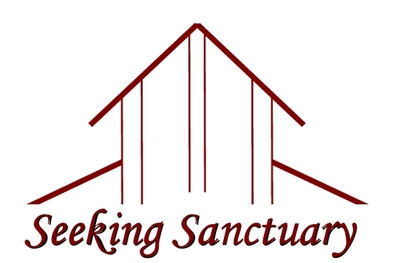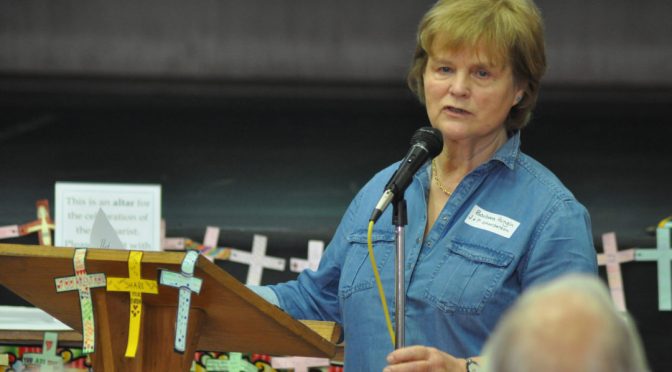Vatican and World Council of Churches announce details of visit by Pope Francis
The Vatican and the World Council of Churches (WCC) on Tuesday revealed details of the 21 June landmark visit of Pope Francis, a visit the WCC described as “a gift to churches”.
More details here:

Speaking personally: Becoming involved in J&P work
I first got introduced to the work of Justice and Peace in 2016 after attending a Tablet organised event. Afterwards I met Barbara Kentish (Westminster Justice and Peace Field Worker) who alerted me to NJPN and their Networking Days, my fascination piqued, I wanted to find out more about what Justice and Peace was all about and attended my first networking event in Manchester. I had been looking to change careers since graduating from University eight years before and for the first time I at that Networking meeting I felt I was in good company with like-minded people sharing the same vision, mission and values.
Since then, I’ve had the privilege of not only following the work of Justice and Peace but also being able to contribute to its direction by being an executive member of the National Justice and Peace Network. This has given me the opportunity to take stock of where our contemporary society stands in relation to the issues Justice and Peace seeks to tackle, namely structural inequality, migration, race, climate change and religious dialogue.
There’s no doubt we live in an extremely complex age where we’re seeing the gradual passing of a generation which had living memory of the last world war and the global sentiments following it which lead to the founding of what would become the European Union and a plethora of other regional and international treaties with the aim of bringing nations and states closer together. We’re now entering an age that demands pragmatism, discernment, sobriety and to an extent, importunity in order to first recognise and secondly take advantage of the opportunities for progress which present themselves to us.
Sometimes it’s tempting to become despondent when we consider the conflicts of attrition permeating most parts of our globe today, not least in Syria which has left an estimated 11.5 million people displaced which equates to 53% of the total population. Also, closer to home when we think about the scourge and suffering caused by domestic slavery, food poverty, homelessness compounded by, at times a tardy public policy processes.
In a recent address from the White House on 14th April, Donald Trump said, concerning Bashar al-Assad’s use of chemical weapons in Douma,
“These are not the actions of a man; they are the crimes of a monster instead.”
One could argue that the use of hyperbole is understandable under these circumstances but as representatives of Justice and Peace, this perhaps provides an opportunity for us to polarise our calling and mission. Niall Cooper, the director of Church Action of Poverty, in the Spring 2017 NJPN newsletter reminded us “All people are of intrinsic worth. All people are of equal value in the sight of God. In fact the Bible is even stronger: all people are made in the image and likeness of God.” The Catechism of the Catholic Church on Social Justice puts it this way, “Respect for the human person proceeds by way of respect for the principle that ‘everyone should look upon his neighbour (WITHOUT EXECPTION) as ‘another self’, above all bearing in mind his life and the means necessary for living it with dignity.’ This same duty extends to those who think or act differently from us. The teaching of Christ goes so far as to require the forgiveness of offenses. He extends the commandment of love, which is that of the New Law, to all enemies. Liberation in the spirit of the Gospel is incompatible with hatred of one’s enemy as a person, but not with hatred of the evil that he does as an enemy”
I MYSELF would go one step further still and say everyone is a person for whom Christ died. So, let us not make monsters out of men but men (and women) out of monsters.
With this in mind, I’m enthused to be a part of the ongoing work of NJPN and see the successful future of Justice and Peace and the NJPN lying in our narrative of restorative justice as opposed to corrective justice, a justice which seeks reconcile people, groups and institutions through dialogue.
Paul Gourdon
NJPN Exec member

NJPN AGM and 40th anniversary celebration:Young people need a chance to shine
On Saturday the twelfth of May, we caught a train to London. It was the earliest we’ve ever set off for a birthday party! We met some wonderful people at the NJPN’s 40 years celebration and AGM from all over the nation. The most heartening thing was that we were spoken to and listened to by everyone. We met all sorts of people from Pat Gaffney (Pax Christi) to Maria Elena (CAFOD), even making friends with Bruce Kent! The way everyone valued our input and let us be as involved as all the adults made us feel like part of the NJPN team. Every time we get involved with NJPN, our faith in everything good and our hope is renewed. Seeing so many good people working together for one big aim, making the world a better place, is so inspirational. Even on the train back, we were starting to plan new ideas. Our favorite part of the day was the networking. So many people gave us so many ideas and offered lots of support and contacts. One phrase that summarises everything we came out thinking is, “Let’s crack on!”
Anna and Eleanor Marshall

Seeking Sanctuary: May Update – Journeys through Hostility
Dear Friends
First, an announcement that we will soon be asking you to take an action that is important – at least, to us. New regulations on data protection come into force later this month, with one consequence being that we must obtain and record your explicit and informed permission to continue to include you on our mailing list. Please do nothing yet, but watch out for an appropriately worded email that we will soon be sending, and act upon it!
Our theme this month is: ‘Let’s Share the Journey’. This is a worldwide campaign started by Pope Francis and Caritas Internationalis – a confederation of over 160 diverse Catholic groups who work at grass-roots in almost every country to reach out to the poor, vulnerable and excluded, regardless of race or religion, and build a world based on justice and goodwill. The campaign aims to promote a ‘culture of encounter’ by reaching out to migrants, changing perceptions regarding the 60 million people in the world who are now estimated have been displaced from their homes through conflict, persecution and other causes.
Pope Francis is concerned that two new international agreements on refugees and migration will be just and effective. They are scheduled to be adopted during the UN General Assembly in September, with the intention that they will provide a framework for policy proposals and practical measures at a global level.
You may be interested in organising or taking part in an event to mark the ‘global week of action’ during Refugee Week from 18 to 24 June this year. Some suggestions include a shared meal with those who are desperately trying to build a new life for themselves and their families. In the words of the Pope ‘I can … see in this person a human being with dignity identical to my own, a creature infinitely loved by the Father, an image of God, …’. CAFODhas suggestions for action on the ‘Share the Journey’ theme.
And all this is in stark contrast to another phrase that is still in vogue at the Home Office – the ‘hostile environment’ – it was confirmed last week that a whole generation of legitimate British citizens have fallen foul of this policy. In fact those seeking sanctuary today experience a hostile environment at every stage of their journey – from the initial trauma of being displaced to the hurdles they have to overcome even to get as far as Calais. Even if they manage to arrive in this country they are excluded from basic services such as health care if they cannot produce the required documentation.
And nowhere has the culture of hostility has been more keenly felt than among the ‘lost’ children who came to the UK from Calais. A report last week pointed to the increase in mental health problems child survivors of rape, torture and trafficking due to the lengthy delays in dealing with their cases. The children ‘rescued’ from Calais in 2016 as well as the 350 ‘Dubs’ children face up to two years delay in having their cases resolved, as discussed in a recentnewspaper article.
A boy who was brought over to join his sibling from Afghanistan who has refugee status faces being deported because he could not cope with the interview process imposed by the Home Office. Even an initial screening interview involves a three month wait. If the Home Office can resolve the cases of the Windrush generation in two weeks, cannot they do better with these traumatised child migrants?
And delays also grow in seeing a start to any action to follow up the key announcement of the May/Macron summit meeting at Sandhurst in January, that child migrants seeking to escape Calais and come to Britain would have their claims processed within 25 days! At least, Lord Dubs succeeded in adding an amendment to the EU Withdrawal Bill in the House of Lords. If accepted by the Commons, this will ensure that, after leaving the Union, the UK will continue to apply the “Dublin III” regulation on family reunion, which has provided child refugees with a vital procedure for legal transfer to the UK. “Calais Action” asks that MPs are lobbied now, to make sure that the amendment survives – see attachment to this message.
Perhaps we should follow the example of the Emmaus charity which temporarily installed a number of open doors on the snow-covered 1850m high Montgenèvre pass in the French Alps, a point thought to have been used by Hannibal, and now favoured by migrants for crossing the frontier from Italy. Emmaus highlights Article 13 of the Universal Declaration of Human Rights, which celebrates its 50th birthday in December. Namely, that: (1) Everyone has the right to freedom of movement and residence within the borders of each state; (2) Everyone has the right to leave any country, including his own, and to return to their country.
Our first visits to Calais in May took place at the very start of the month when Ben and Phil separately took over quantities of ‘Vinnie bags’ produced for rough sleepers by the Society of St Vincent de Paul in London, as well as clothes kindly donated from a variety of sources. It was good to see that the Care4Calais warehouse was a hive of activity, sending van-loads of aid to Brussels, Dunkirk and Paris, as was Auberge des Migrants warehouse operated by ‘Help Refugees’ alongside the Refugee Community Kitchen.
We are now experiencing occasional runs of a few days of summer weather, but these hide the fact that the temperatures in Calais still fall to single figures at night, and that rough sleepers are rendered yet more cold when storms blow in from the North Sea or across the flat former battlefields of the wars of the 20th century. Humanitarian aid is still vital and in conclusion, we are delighted to praise the example of the young people of Kent’s Bruderhof Community who have posted avideoof their return journey to Calais, where they helped to fill and distribute much-needed bottles of drinking water. (This follows up their Februaryjourney, which we helped to facilitate.)
Thank you for your continued support.
Phil + Ben.
‘Seeking Sanctuary’ aims to raise awareness about people displaced from their homes and to channel basic humanitarian assistance from Faith Communities and Community Organisations via partnerships with experienced aid workers. Our special concern is for those who arrive in north-western France, mistakenly expecting a welcome in the UK. Almost all the 8,000+ migrants in Calais in October 2016 were moved away, hopefully to better accommodation. 1616 unaccompanied minors also left, along with hundreds of vulnerable women and children, hoping that claims to stay in the UK or France would be processed. Many judge that they have been let down, and hundreds have returned to sleep rough near Calais and along the coast. The Grande-Synthe camp near Dunkirk burnt down in April 2017, displacing around 1400 people, over 950 of them moved elsewhere, whilst the rest remain nearby, joined by scores of newcomers weekly.
They need food, good counsel and clothes, which are accepted, sorted and distributed by several Calais warehouses, which also supply needs further afield.
Further information from Ben Bano on 07887 651117 or Phil Kerton on 01474 873802. See our latest news at www.seekingsanctuary.weebly.com



Middlebrough Diocese J&P Commission: Environment Policy Launch
Inspired by Pope Francis’ encyclical Laudato Si’, the Diocese of Middlesbrough Justice and Peace Commission has launched its environment policy at All Saints’ School in York.
Read the report here:
Columban Faith in Action Volunteer 2018-19
Are you looking for a great opportunity – a really life changing year focused on personal development, volunteering with refugees and asylum seekers, working with young people and educators to explore faith and justice, time overseas, … and it’s based in wonderful Birmingham, youthful and diverse!
More details here: Faith in Action 2018 ad
WCC – “Sharing faith, nurturing hope”
The World Council of Churches (WCC) Annual Review 2017 is available for download online. The annual review records many of the WCC’s activities undertaken in 2017 and continuing into 2018.
More details here:
Spring Appeal for Maria Skobstova Catholic Worker House in Calais
Please help support vital ongoing work at Maria Skobtsova House in Calais. Maria Skobtsova house was founded two years ago to serve the most vulnerable refugees and migrants living in the refugee camp in Calais, and to tend to the sick who were hospitalised. Despite the closure of the Calais camp in October 2016, Br Johannes Maertens work continues. Many of those who are helped at the house today are young refugees, mostly Ethiopian and Eritrean boys in their teens. Some boys are only 14 years old, and some girls just 16 years old. There is no longer any infrastructure for child refugees left in Calais, and these children are very vulnerable to being trafficked, as they are often unaccompanied minors.
SHELTER: In the first half of 2017 alone, Maria Skobtsova House accommodated more than 60 vulnerable or young refugees, either at the house, or through a small hosting network, keeping them sheltered from cold, rain and violence.
ACCOMPANY: The house also provides accompaniment – young workers or lawyers regularly visit the young refugees at the house informing them of their rights, as does an Eritrean co-worker from Caritas France. Br Johannes also works closely with other organizations to guide those who may have a legal route to the UK or settle legally in France.
COMMUNITY: The most vulnerable are provided with a community, a place of prayer, support and friendship. Art therapists from Art Refuge UK also work in the house on a weekly basis helping refugees to tell their stories, through art and creativity. Maria Skobtsova House works as an advocate for the refugees. The Friends of Maria Skobtsova House are asking for an urgent Christian response to this inhumane situation. Can you help?
DONATING: If you are able to, please consider donating towards the ongoing costs of the house at: https://www.justgiving.com/campaigns/charity/rcdiocese-westminster/westminsterjp3-safechildrencalais
Br Johannes is also looking for specific items of clothing and footwear
More information here:
Westminster Justice and Peace Commission , 4 Vincent Rd, London N15 3QH
Tel 00 44 (0) 208 888 4222
Welcoming the stranger, watch out for ways of helping refugees!
Follow us on Facebook and Twitter, and visit our website for updates!
Corporate courts thrown out by Europe. Now Britain must follow the lead
A landmark ruling by the European Court of Justice (ECJ) 6 March could mark the beginning of the end of the so-called ‘corporate court’ system within Europe.
This infamous system is now to be found in hundreds of trade and investment deals. Under the guise of protecting investments in foreign countries, the investor-state dispute settlement (ISDS), as it’s officially known, allows big business and super-wealthy investors to sue foreign governments for regulations they don’t like. What’s more these courts exist outside the normal legal framework, are presided over by corporate lawyers and usually meet in secret, with no right of appeal.
Read more here:

CTBI: Witnessing Together – April 2018
The April Newsletter from Churches Together in Great Britain and Ireland is now available.
Download here:









